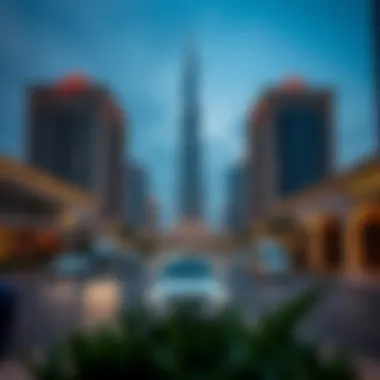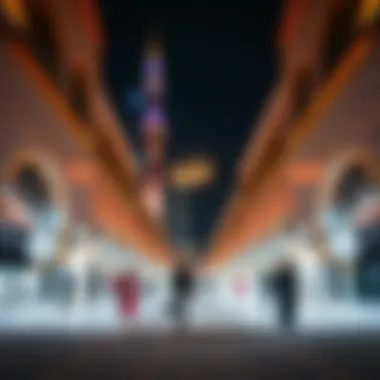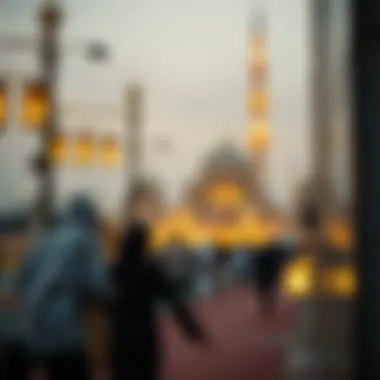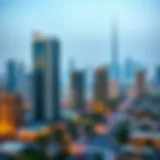Ramadan in Dubai 2024: Culture and Real Estate Insights


Intro
As the crescent moon rises, marking the beginning of Ramadan, Dubai transforms into a vibrant blend of tradition and modernity. This holy month is not just about fasting; it shapes the cultural and economic landscape significantly. In 2024, understanding how Ramadan influences the real estate market in Dubai offers a unique perspective for investors, homebuyers, and real estate agents eager to navigate this period effectively. This article will delve into how fasting rituals intertwine with lifestyle adjustments, market trends, and investment opportunities, providing a thorough understanding of the unique dynamics present during Ramadan in the emirate.
Market Trends in Dubai Real Estate
Current Market Overview
The Dubai real estate market is currently experiencing a renaissance. After several tough years, a recovery seems firmly established. In 2024, the increase in demand is being driven by several factors, including population growth, economic stability, and increasing foreign investments. This uptick comes at a time when more expatriates are settling in Dubai, highlighting the emirate's allure as a global hub.
As Ramadan approaches, one should expect to see certain shifts in the market. The holy month often brings a focus on community and spirituality, and this atmosphere influences the types of properties that are in demand. Family-oriented neighborhoods are likely to attract attention during this time, reflecting a desire for communal ties and easy access to mosques and traditional markets.
Price Trends and Forecasts
In terms of pricing, a careful analysis indicates a steady increase in property values. According to recent reports, Dubai's real estate prices have seen a growth of about 10% year-on-year, with forecasts suggesting this trend will continue as Ramadan brings a flurry of activity. Investors should pay closer attention to seasonal fluctuations that may arise during this month.
The influx of expatriates seeking homes contributes to heightened competition in the rental market. Alternatively, some areas may experience a temporary slowdown in transactions as potential buyers and renters shift their focus to Ramadan activities and family engagements. Understanding this fluctuation can help in making timely decisions.
"Investors who leverage the unique dynamics of Ramadan can find lucrative opportunities in the Dubai property market."
Investment Opportunities
Hot Areas for Investment
Identifying prime locations for investment during Ramadan is crucial. Historically, areas such as Dubai Marina, Downtown Dubai, and Jumeirah have attracted substantial interest. These regions not only boast luxurious amenities and proximity to cultural hotspots but also foster a community environment that resonates during the holy month.
Additionally, Al Barsha and Dubai Hills Estate are becoming increasingly popular among young families seeking a vibrant community experience during Ramadan. Properties in these neighborhoods typically see a higher demand, especially near mosques and community centers that host iftar gatherings.
Rental Yield Analysis
When considering the rental yield, investors should be strategic. In 2024, properties close to commercial hubs and public transportation are likely to yield higher returns. An analysis reveals that rental yields in DIFC and Business Bay have maintained attractiveness for short-term renting, especially since more visitors flock to these areas for Ramadan events and festivities.
Rental yields can fluctuate based on seasonal demand, and Ramadan will likely bring a unique opportunity for landlords to adjust their leases accordingly. Additionally, the potential for hosting families or groups during Ramadan can boost occupancy rates significantly.
In summary, understanding the intertwined cultural and market dynamics during Ramadan can serve as a game-changer for investors and real estate professionals in Dubai.
Understanding the Significance of Ramadan in Dubai
Ramadan is not just a month of fasting for Muslims; it is an observance steeped in rich history, cultural significance, and community bonding. In a cosmopolitan hub like Dubai, the essence of Ramadan extends beyond the religious practices. This period offers investors, homebuyers, and real estate agents a unique lens through which to perceive the local market dynamics. Understanding how Ramadan influences various facets of life in Dubai aids in making informed decisions, especially for those interested in the real estate sector.
Historical Context
Ramadan's history in Dubai intertwines with the development of Islamic traditions in the region. Traditionally, the month of Ramadan commemorates the momentous occasion when the Holy Quran was first revealed to the Prophet Muhammad. This aspect resonates deeply with the local population, offering a chance for both remembrance and spiritual growth. The cultural tapestry of Dubai reflects this rich heritage, where the local and expatriate communities approach the holy month with a mixture of reverence and adaptation. Over the decades, as Dubai transitioned from a modest trading center to a global metropolis, the observance of Ramadan evolved. Not only did it retain its spiritual roots, but it also incorporated modern elements that cater to its diverse demographic.
Cultural Traditions
During Ramadan, unique cultural customs come to life, painting a vivid picture of communal ties. Families often gather for Iftar, the nightly meal that breaks the fast, marking the end of the day's abstinence. Streets buzz with the aroma of culinary delights being prepared, as homes and restaurants alike fill with the sounds of laughter and chatter. In Dubai, you might notice special tents popping up around town, known as Iftar tents, where individuals from all walks of life come together to share meals.
Moreover, Dubai embraces its multicultural identity during this time, promoting interfaith dialogue. Community events and charity initiatives flourish, offering food and aid to those in need. This spirit of giving, mixed with the joy of shared moments, contributes significantly to the city's social fabric.
Modern Observances
With advancements in technology and changes in societal norms, modern observances of Ramadan in Dubai exhibit remarkable adaptability. Ramadan’s significance today goes beyond fasting; it also encompasses social activities, educational workshops, and cultural festivals. Many organizations and businesses adapt their hours to accommodate fasting schedules, exhibiting a growing awareness of the important lifestyle adjustments many in the community undergo during the month.
Digital platforms see a swell in Ramadan-themed content, as companies leverage social media to connect with the audience through campaigns that celebrate values of generosity and mindfulness. Additionally, community leaders and influencers often promote wellness initiatives guiding individuals on maintaining balanced lifestyles while fasting.
The evolution of Ramadan practices in Dubai highlights a blend of tradition and modernity, making the holy month an ideal period not only for spiritual growth but also for strategic market considerations, particularly in the real estate sector. As more people flock to Dubai, understanding how this month impacts everyday life is essential for navigating the complexities of the local market.
Impacts of Ramadan on Dubai's Real Estate Market
Ramadan, a month of spiritual reflection and community bonding, impacts numerous facets of life in Dubai, including the real estate market. With the influx of visitors, the adjustment in local routines, and specific buyer behavior shifts, understanding how Ramadan affects the property landscape in Dubai is crucial for investors, homebuyers, and real estate professionals alike. This correlation plays a notable role in shaping decisions, strategies, and outcomes in property investment during this sacred month.
Market Activity During Ramadan
During Ramadan, the overall activity in the real estate market sees a unique transformation. While it may appear that some transactions slow down due to the fasting schedule, the reality is mixed. Real estate agents and investors experience a setting where traditional timelines are adjusted.
- Peak Hours: Many prospective buyers prioritize their visitations around sunset or after evening prayers, known as taraweeh. Hence, real estate viewings may be scheduled for later in the evening.
- Online Engagement: Virtual tours gain traction since buyers prefer exploring properties from the comfort of their homes, especially after iftar.
Additionally, while some may wind down operations temporarily, others recognize the potential to capitalize on this period when competition may dip.
Changes in Buyer Behavior


The fasting month influences the psyche and behavior of buyers contemplating purchases. A few notable trends emerge:
- Prioritization of Family-Oriented Spaces: Many buyers lean towards properties that feature communal spaces or areas conducive to family gatherings. With a focus on togetherness during iftar, layouts that accommodate large gatherings become more attractive.
- Increased Interest in Rental Properties: For those who seek temporary accommodation during Ramadan, rental properties that cater to larger families or groups rise in demand. This includes serviced apartments that offer amenities welcoming for those celebrating Ramadan.
- Emphasis on Community Spirit: Buyers are now more inclined to invest in neighborhoods that offer community connections, cultural celebrations, and amenities tailored to Ramadan activities.
Investment Opportunities
Ramadan presents unique investment opportunities worth noting, especially in 2024. The emotional aspects of the season lead to some significant trends:
1. Emerging Developments:
New developments aimed explicitly at enhancing the Ramadan experience are appealing to investors. Properties featuring stunning rooftop spaces for iftar gatherings or family-friendly amenities witness a surge in interest.
2. Commercial Real Estate:
Businesses in Dubai ramp up preparations for Ramadan, leading to substantial openings in retail and dining opportunities. Investors may find greater potential in commercial listings by aligning with the festive needs.
3. Short-Term Leases:
With many expatriates and visitors flocking to Dubai during Ramadan, leasing vacant residential spaces or short-term rentals become increasingly profitable. Investors can gain from higher demand for properties suited for tourists wanting to experience the charm of Ramadan in this vibrant city.
“The beauty of Dubai during Ramadan is in its spirit of unity, which ofters numerous opportunities not just in community but also in the real estate sector.”
Personal Experiences: Living Through Ramadan in Dubai
Living through Ramadan in Dubai offers a unique blend of spiritual connection and communal engagement, presenting an opportunity for both residents and newcomers to delve into the rich tapestry of Emirati cultural practices. This period isn't merely about fasting; it's a comprehensive experience that shapes one's daily routines, fosters community ties, and emphasizes shared meals. Understanding how to navigate these elements can provide valuable insights for potential investors, homebuyers, and real estate agents, as it highlights the lifestyle shifts and market dynamics inherent during this holy month.
Daily Routines
During Ramadan, daily routines undergo a significant transformation. The usual hustle and bustle of Dubai gives way to a more subdued rhythm defined by dawn and dusk—specifically, the pre-dawn meal known as Suhoor and the evening meal, Iftar.
Many households adjust their sleep schedules, trading late-night activities for early mornings. Streets that were once lively become quieter at sunrise, while the sound of the call to prayer marks the beginning of the fasting day.
- Morning Shift: Most people wake up before dawn for Suhoor, loading up on nutrient-rich foods to sustain them throughout the day. Some prefer trading a lengthy meal for a quick bite, ensuring they stay energized.
- Business Hours: Employers in Dubai often modify work hours during Ramadan. Many businesses operate with reduced hours, which affects market dynamics. It's important for investors to consider how these hours impact retail and service businesses in the area.
- Post-Fast Gastronomy: After sunset, family and friends gather to break the fast with Iftar, often starting with dates and water, followed by a spread of traditional and contemporary dishes.
The entire day is an intertwining of faith, gratitude, and deep-rooted customs, shaping a rich living experience.
Community Gatherings
Communal bonds take center stage during Ramadan in Dubai, underscoring the emphasis on togetherness and empathy. Neighborhood Iftar gatherings and community iftar tents sprout throughout the city, where people come together to share meals, stories, and laughter. These gatherings provide a sense of belonging, often transcending cultural boundaries as families of various backgrounds intermingle.
- Iftar Tents: Various entities, including hotels and community centers, set up large tents where anyone can join for free meals, promoting an ethos of generosity. These tents often host hundreds of families, creating vibrant social scenes.
- Cultural Exchange: Investors and homebuyers can benefit from understanding the melting pot of cultures that gather in Dubai. With diverse nationalities participating, it highlight's Dubai's unique character and its down-to-earth hospitality during this sacred month.
"Ramadan in Dubai is not just a month; it's a showcase of unity and compassion where barriers are diminished—every gathering tells a new story."
- Volunteerism: Many residents engage in charitable acts during this time, donating food and resources to those in need. Such acts contribute to Dubai's sense of community and aid various socio-economic dynamics, indicating potential investment areas related to charitable organizations and community spaces.
Observance of Iftar and Suhoor
The observance of Iftar and Suhoor carries significant cultural weight, distinctly characterizing the month of Ramadan in Dubai. While it may seem straightforward, both meals are often elevated by their communal atmosphere.
- Culinary Delights: Iftar meals span a range of dishes, from traditional Emirati delicacies to modern renditions of international cuisines. This culinary diversity attracts attention from food enthusiasts and can influence culinary-related real estate, such as commercial dining spaces.
- Restaurants’ Adaptation: A collaborative effort by restaurants in Dubai to cater to the fasting community leads to spectacular Iftar buffets and special offers. Many establishments create unique dining experiences, which can be lucrative for real estate investors looking to capitalise on the food and beverage sector.
- Diverse Offerings: Focus on restaurants that not only cater halal options but also showcase fusion dishes that resonate with various cultural influences in Dubai. Understanding these options can provide insights into consumer behavior, which is vital when considering potential investments in dining establishments.
Investing in Dubai Real Estate During Ramadan
Investing in Dubai's real estate market during Ramadan can be a unique opportunity that intertwines spiritual observance with financial posture. The month of Ramadan impacts not just the daily lives of its residents but also the economic landscape, particularly real estate. For investors and homebuyers alike, this period can yield substantial gains if approached with the right mindset and strategy.
The high demand for housing during Ramadan often sparks a noticeable shift in the market's dynamics. It's not simply about finding a place to live; it's also about understanding how cultural practices can shape buying decisions and market valuations during this significant month. Whether you're a seasoned investor or a first-time buyer, there are both benefits and considerations to take into account.
Identifying Key Areas for Investment
When looking at potential investment spots, there are several neighborhoods to consider in Dubai. Areas such as Dubai Marina and Downtown Dubai continue to attract attention due to their luxury amenities and proximity to major commercial hubs. Conversely, emerging districts like Dubai South and Dubai Hills Estate offer more affordable options without sacrificing modernity or lifestyle appeal.
Key factors that can guide your decision include:
- Accessibility: Areas near public transportation tend to see more sustained demand.
- Community Vibe: Look for locations that foster a sense of community, particularly those with Iftar events or communal activities.
- Amenities: Proximity to supermarkets, healthcare, and recreational facilities often influences rent and resale values positively.
"A good location during Ramadan can mean a thriving investment throughout the year."
Understanding Seasonal Pricing Trends
In Ramadan, the real estate market in Dubai undergoes certain fluctuations that are distinct from the rest of the year. Understanding these pricing trends is crucial for maximizing your investment. Generally, there’s an increase in short-term rental prices, driven by the influx of visitors and tourists seeking a blend of culture and luxury.


Among the things to consider:
- Increased Demand: As businesses often provide special offers, this can heighten interest in rentals around Iftar time.
- Possible Discounts: Some sellers may be more open to negotiation, looking to close sales before Eid, creating opportunities for buyers.
- Changing Buyer Sentiments: Ramadan can spark a mindset shift; potential buyers might feel compelled to invest due to spiritual motivations or familial ties.
Negotiation Strategies
Effective negotiation during Ramadan requires a nuanced approach, especially as emotions can run high during this period. Successful investors need to tread lightly around cultural sensitivities while still aiming for favorable terms. Here are a few strategies to consider:
- Be Respectful of Time: Understand that schedules can be disrupted during fasting hours. Frame meetings around times convenient for both parties.
- Show Empathy: Engage in discussions about Ramadan practices; showing cultural understanding builds trust.
- Highlight Value: Emphasize the long-term benefits of the investment, especially those that align with the traditions of sharing and community.
- Flexible Offers: Being open to various types of deals, such as lease-to-own, can appeal to sellers during this reflective time of year.
Conclusively, investing in Dubai's real estate during Ramadan is a blend of cultural insight and market savvy. Those who are attuned to the rhythms of the holy month and approach the market thoughtfully stand to reap significant rewards.
Regulatory Environment for Real Estate During Ramadan
The regulatory environment during Ramadan in Dubai is a critical element for investors and homebuyers to navigate thoughtfully. It’s a juncture where local customs blend with regulatory practices, impacting how real estate transactions are handled. Understanding the specifics regarding property laws, compliance deadlines, and transaction procedures is essential. Especially during this holy month, there are nuances that can either create hurdles or open opportunities.
Key Regulations to Consider
Several regulations come into play during Ramadan that investors and real estate agents should be aware of. For instance:
- Office Hours Adjustments: Many government offices and financial institutions adjust their working hours during Ramadan. Hence, investors need to be aware that services may not be available at all times, which can delay transactions.
- Contract Terms: Contractual obligations may need to reflect the changed pace of business during Ramadan. For example, some closing timelines could be extended to accommodate the fasting schedule of various stakeholders involved in transactions.
- Sharia Compliance: In deeper integration of culture and law, many property transactions in Dubai must adhere to Sharia principles. This is especially pertinent in a month of heightened spiritual awareness and compliance.
- Offers and Negotiations: Ramadan is traditionally a season for gatherings and goodwill. This can impact motivation levels around property deals, necessitating patience and strategic timing during negotiations.
Being informed about these aspects can save investors a lot of time and headaches.
Significance of Timely Compliance
Timely compliance during Ramadan is not just a procedural formality; it’s often critical for a successful transaction. Many investors may overlook the deadlines set forth by the regulatory bodies, which can lead to unnecessary complications. Relevant considerations include:
- Permit Applications: Many permits and approvals may require processing during Ramadan. Delays could significantly affect construction timelines or the launching of new properties.
- Financial Transactions: Real estate investments often involve considerable sums of money that follow tight deadlines for compliance regarding bank paperwork and approvals.
- Impact on Market Sentiment: Delayed compliance can influence broader market sentiment and lead to decreased buyer confidence. When transactions are visibly stalled, it can signal trouble, influencing decisions across the board.
"Making sure that everything is in order before Ramadan is essential. It helps you to avoid last-minute chaos when everyone else is either too busy or too distracted.”
Ultimately, navigating the regulatory environment during Ramadan involves being proactive, asking the right questions, and anticipating the changes that come with the holy month. By doing so, investors can enhance their strategic positioning in a unique market landscape.
Emotional and Psychological Dimensions of Ramadan
Ramadan is more than a month of fasting; it embodies a deep emotional and psychological journey. In the vibrant city of Dubai, where cultures intertwine, this journey shapes community dynamics and personal introspection. The emotional landscape during this holy month stresses unity, empathy, and spiritual growth.
Community Support Systems
The fabric of community support during Ramadan in Dubai is woven with kindness and generosity. Families often open their homes to share iftar meals, creating a warm environment that fosters togetherness. Initiatives like the Ramadan Tent offer a communal space where individuals can break their fasts together, naturally cultivating a sense of belonging.
With a predominant focus on helping those less fortunate, many people volunteer for charitable organizations, emphasizing the principle of giving. Donations pour in, from food collections to financial support, all aimed at uplifting those in need. This collective effort not only strengthens relationships but also enhances one's emotional well-being, making individuals feel part of something larger.
The importance of mental health also takes center stage. During Ramadan, community gatherings can alleviate feelings of isolation, especially for expatriates who may be far from home. These interactions provide emotional reinforcement, easing the burdens that come from being away from loved ones. The exquisite balance of community support bolsters the mental health of individuals during this spiritually enriching time.
The Role of Spiritual Reflection
The role of spiritual reflection during Ramadan cannot be understated. This period serves as a personal retreat from the chaos of daily life, facilitating an introspective journey that many Muslims eagerly embrace. In Dubai, the serene sunset over the skyline becomes a moment of stillness, inviting reflection and gratitude.
For many, the act of fasting transcends physical abstinence from food and water. It’s a chance to meditate on one's life choices and relationship with the divine. Nightly prayers become a communal activity, drawing individuals into a shared experience of spiritual enrichment.
During Ramadan, self-discipline and mindfulness are cultivated, not just in terms of fasting but in behavior and interactions with others. This transformation can lead to improved mental clarity and emotional resilience. The grappling with one’s inner self during this month can foster a sense of peace and renewed purpose that lingers long after Ramadan has ended.
In essence, Ramadan is a unique convergence of emotional fortitude and spiritual enlightenment, particularly evident amidst Dubai's dynamic urban tapestry.
Thus, as we navigate the emotional and psychological dimensions of Ramadan, it's clear that this holy month impacts not only personal growth but also strengthens the bonds of community across Dubai's diverse landscape. Families, friends, and neighbors come together, reflecting the true meaning of Ramadan in every bite of food shared and every prayer whispered.
Culinary Offerings During Ramadan
The culinary landscape during Ramadan in Dubai reveals much more than just a variety of dishes. It's a heartwarming blend of cultural tradition, community bonding, and modern interpretation. Food plays a crucial role during this holy month as it brings people together to break their fast and nourish their souls. For investors, homebuyers, and real estate agents, understanding these culinary offerings can also present unique opportunities in the market.
Traditional Emirati Dishes
In the bustling city of Dubai, the aroma of traditional Emirati dishes fills the air, especially during Ramadan. Classic meals like Al Harees and Machboos take center stage. Al Harees, a simple yet labor-intensive dish made of wheat and meat, speaks volumes of Emirati culture. Achieving its rich texture requires slow cooking, often bringing families together for its preparation.
Machboos, a rice dish cooked with spices, meat, and aromatic saffron, symbolizes the culinary tapestry of the region. Not only do these dishes satiate hunger, they represent a deeper sense of urgency to revive family traditions. They play an essential role in gatherings at Iftar, where families and friends come together after a long day of fasting.
"Food is not just fuel; it's a way to connect with our heritage and each other during Ramadan."
Moreover, dishes like Samboosa, fried pastry filled with a variety of ingredients, are a staple during Iftar. Their crispy texture and delicious fillings make them a must-have at any Ramadan table. In addition to the taste, preparing and sharing these dishes promotes community bonds, it connects individuals who may be experiencing Ramadan away from their families.


Modern Interpretations and Fusion Cuisine
As Dubai continues evolving, so does its culinary scene during Ramadan. Modern interpretations or fusion dishes have emerged, catering to a diverse palate. High-end restaurants in the emirate now offer Ramadan menus that include contemporary twists on traditional meals. For instance, a restaurant might serve Machboos with a touch of truffle oil, or perhaps present Al Harees with a gourmet flair that draws the attention of both local and international diners.
Additionally, the use of alternative ingredients in traditional recipes has gained traction. Gluten-free versions of encapulated dishes are on the rise, catering to health-conscious eaters. There’s an exciting trend where chefs incorporate international flavors into classic dishes, creating a melting pot of culinary creativity.
This shift isn’t just about the food itself; it reflects the changing demographics of Dubai. With residents from various cultural backgrounds, these culinary innovations foster inclusivity and shared experiences. For investors and homebuyers, this aspect of Dubai’s food culture enhances the city’s appeal as a destination for not just living but for experiencing unique cultural exchanges.
Cultural Events and Festivals in Dubai During Ramadan
Cultural events and festivals during Ramadan in Dubai are not just activities or entertainment; they represent the heart and soul of communal gathering during this significant month. Engaging in these events provides an opportunity for individuals to foster connections, deepen cultural understanding, and embrace the fabric of Dubai's diverse society. These gatherings allow the city's residents, including expatriates and locals, to celebrate in unity, reflecting the important values of compassion, generosity, and community that this holy month promotes.
Public Gatherings and Activities
Public gatherings during Ramadan loom large in Dubai’s cultural calendar, enticing both long-term residents and visitors alike. One of the most anticipated events is the nightly Iftar gatherings, where people break their fast together at community centers or large outdoor venues across the emirate. Whether it’s in bustling parks or luxurious hotels, the atmosphere is one of joy and celebration. These events often feature a rich variety of traditional Emirati dishes alongside international cuisines, showcasing the multicultural tapestry of Dubai’s population.
Another highlight is the Ramadan Night Market, which becomes a vibrant hub for shopping and entertainment. Here, families flock to explore stalls laden with handicrafts, clothing, and delectable food items. Local artisans often shine brightly in these markets, offering one-of-a-kind products that blend tradition with modern flair. The spirit of Ramadan notably elevates the shopping experience, with many vendors providing discounts and promotions, creating an enticing environment for both buyers and sellers.
Activities worth attending include:
- Suhour gatherings that welcome families and friends before dawn,
- Cultural performances, including traditional music and dance,
- Workshops about local customs related to Ramadan.
These elements do not only entertain but also educate about the rich tapestry of traditions and beliefs that guide the community's practices during this holy month. For investors, understanding these social dynamics is pivotal; they reflect not only the lifestyle of Dubai's residents but also their collective preferences and interests.
Art and Cultural Exhibitions
Art and cultural exhibitions during Ramadan serve as a deep dive into the rich heritage and vibrant expressions of the region. Throughout the city, galleries and museums host events that allow individuals to explore Islamic art, history, and contemporary works. This is exemplified by events like the
Preparation for Ramadan in Dubai
As Ramadan approaches, the preparations that go into ensuring a smooth transition into this holy month become paramount, especially in a city as dynamic as Dubai. For residents and newcomers alike, preparation involves both spiritual and practical adjustments that reflect the overarching themes of community and reflection during this period. Commitment to these preparations enriches the experience of Ramadan for all involved, impacting everything from personal routines to the real estate market in the city.
Home Adjustments
When one thinks about preparing their home for Ramadan, it's not just about the décor. The atmosphere inside the house plays a vital role in setting the tone for family gatherings, particularly during iftar, the meal to break fast. Families often invest in new furniture to create a welcoming dining space or opt for subtle changes like introducing soft lighting that embodies a sense of warmth and togetherness.
- Decorations: Traditional lanterns and crescent moon symbols adorn homes, serving as reminders of the significance of the month. Spaces for prayer are often set up to encourage reflection and community worship.
- Kitchen Organization: Families may reorganize kitchens, stocking up on essential ingredients to prepare traditional dishes. This is something that most households do, tweaking their cooking setups to ensure efficiency during the busy mealtime preparations.
- Outdoor Spaces: Many opt to beautify their gardens or balconies to host communal gatherings, a key aspect of Ramadan—bringing people together to share meals and stories.
Significant Considerations
Real estate professionals recognize that these home adjustments can influence market dynamics. Homes equipped for entertaining relatives or friends often attract more interest, thereby affecting property valuations. Families investing in their homes during Ramadan can lead to increased demand for properties that allow for larger gatherings.
Resource Allocation
During Ramadan, resource allocation becomes crucial as individuals adjust their spending habits and focus on essential needs versus wants.
- Budgeting: Families typically look over their finances, prioritizing essential expenditures. This could mean revisiting monthly budgets to account for increased food costs or donations to charity, a significant part of Ramadan.
- Charitable Contributions: Many residents allocate a portion of their resources toward helping the less fortunate. This includes supporting local charities, which often see a spike in donations during the fasting month.
- Time Management: Just as financial resources need careful allocation, managing time becomes essential. The rhythm of daily life shifts to accommodate fasting schedules, leading to longer evenings spent in community prayers and meals. Adjusting work hours or managing personal commitments helps people prioritize their spiritual practices without neglecting professional obligations.
“During Ramadan, every moment becomes sacred, and managing these resources helps ensure that spiritual commitments can be fulfilled alongside daily responsibilities.”
By addressing home adjustments and resource allocation effectively, families can navigate the complexities of Ramadan in Dubai more smoothly. Understanding these elements offers valuable insights into how the cultural and market dynamics intertwine during this holy month, making it a unique period for those engaged in the real estate sector as well.
For more about the cultural significance of Ramadan, you can explore Wikipedia or visit Britannica.
Post-Ramadan Reflections: Real Estate Market Insights
Ramadan, a month of spiritual renewal and community bonding, brings about a unique set of influences on Dubai's real estate market. Once the festivities wrap up, the aftermath is just as telling as the month itself. Understanding how the conclusions of Ramadan impact investors, homebuyers, and real estate agents is crucial in positioning oneself wisely in the market.
Evaluating Market Trends
Post-Ramadan, the real estate sector often experiences a shift that can be attributed to several interrelated factors. The end of fasting and evening celebrations can spark renewed interest in home buying or leasing. Traditional beliefs tend to see families and individuals looking to initiate new life chapters during this time, whether by moving into a new home to start afresh or finding that perfect rental.
Some key aspects to consider when evaluating market trends include:
- Increase in Demand: After a month of fasting, demand tends to rise as many consumers are eager to make commitments that were put on hold. They actively look to finalize deals in anticipation of the summer months.
- Market Sentiment: There's often a shift in buyer sentiment; people may start viewing properties not just as housing but as investment opportunities. The lifting of celebratory restrictions can lead to more site visits and showings, which pushes sellers to be more open to negotiations.
- Sales Activity Surge: Historically, the transaction volume increases sharply in the weeks following Ramadan, encouraging stakeholders to act quickly.
As investors look to capitalize on this period, keeping an eye on these trends will foster a more tactical approach to engaging with the market.
Future Predictions for the Market
Looking ahead, several predictions emerge that could influence Dubai's real estate landscape post-Ramadan. It’s worthwhile for stakeholders to be on the lookout for these potential changes to make informed decisions:
- Sustained Growth: Given the uptick in consumer interest, it is reasonable to expect a sustained growth trajectory for the remainder of the year. This growth may be driven by factors like increasing population and the promise of Dubai as a hub for business.
- Commercial Spaces Demand: With high consumer activity in the market, an evident increase in demand for commercial spaces is likely. The rise of new businesses or expansion of existing ones may open avenues for investors looking to diversify their portfolios.
- Increased Investor Activity: Investors who recognize the shift in market dynamics post-Ramadan could see favorable opportunities. The focus on difficult-to-find properties may increase, along with intrinsic property values.
- Regulatory Changes: As consumer behavior transforms, there may be corresponding adjustments in regulations that could impact investment prospects and property management.
“Understanding the market post-Ramadan isn’t just about the numbers; it’s about understanding the people driving those numbers.”
Investors and real estate professionals who remain attuned to these predictions can better navigate the post-Ramadan landscape to harness opportunities effectively. Comprehensive analysis and proactive strategies will lead to smarter investment decisions, ensuring that they remain ahead of the curve in an ever-evolving market.















